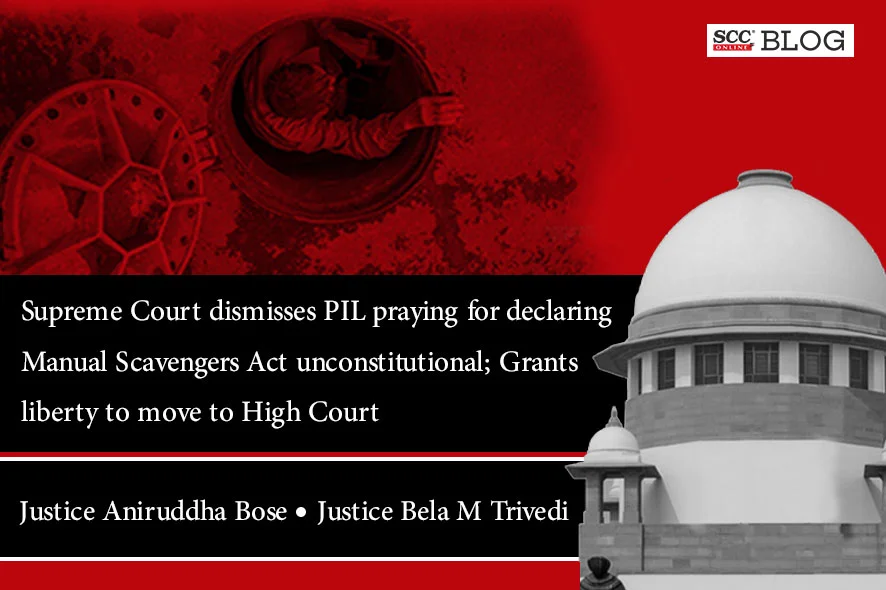Supreme Court: In a writ petition (PIL) filed praying for declaring Sections 2(1)(g), 11, 12, 13, 14, 15, 16, and 39 of Prohibition of Employment as Manual Scavengers and their Rehabilitation Act, 2013 (‘Act, 2013’) as well as Rules 3, 4, 5, and 6 (2) of the Prohibition of Employment as Manual Scavengers and their Rehabilitation Rules, 2013 (‘Rules, 2013’) as unconstitutional, being violative of Articles 14, 16(2), 17, 21, and 23 of the Constitution of India, the division bench of Aniruddha Bose and Bela M Trivedi, JJ. has dismissed the petition and granted the petitioner liberty to move to the High Court under Article 226 of the Constitution.
Background:
In this case, the petitioner is the wife of a Sewer Cleaner who died on 06-08-2017 while performing “Hazardous Cleaning” in Lajpat Nagar, Delhi which is prohibited under Section 2(d) of the Act, 2013 and Rules, 2013. She stated that Section 2 (1) (g) of the Act of 2013 which defines the expression “manual scavenger” is not only manifestly arbitrary but also against the principles of reasonable classification, as it excludes from its purview the “sewer cleaner and septic tank cleaner doing hazardous cleaning” as they also clean, carry, dispose of and handle human excreta from more dangerous places. It deprives them of the benefit of identification and rehabilitation provided under Section 11 to Section 16 of the Act, 2013 and Rules, 2013 and other beneficial schemes brought by Government time to time and, thus, violative of Article 14, Article 16(2), Article 17, Article 21, and Article 23 of the Constitution of India. Section 2(1)(g) read in tandem with other provisions, such as Section 11 to Section 16 of the Act, 2013 also fails to match the test of reasonable classification under Article 14 of the Constitution of India.
The petitioner stated that the classification created by the Act of 2013 between the persons cleaning human excreta from the surface without protective gears (Manual Scavengers) and the persons cleaning human excreta from the sewer or septic tank without protective gears (sewer cleaner and septic tank cleaner doing hazardous cleaning) is unreasonable as it does not satisfy the test of social conduciveness. Moreover, Explanation (a) of Section 2(1)(g) read with Section 11 to Section 16 of the Act, 2013 discriminates persons engaged or employed on “daily wages”, “temporary basis”, and “Jajmani” for cleaning, handling, carrying, disposing of human excreta. Thus, it violates Article 14 and Article 16(2) of the Constitution of India.
Besides this, the petitioner prayed to provide rehabilitation and other benefits to the family of the sewer cleaners and septic tank cleaners, the family of the persons carrying on, handling, disposing of human excreta with protective gears and devices, the family of the persons engaged by any employer on daily wages, temporary basis and Jajmani for carrying on, handling, disposing of human excreta, in the same way as provided to the families of the manual scavengers.
Moreover, Section 2(1)(g), Section 39 of the Act, 2013, Rule 3, Rule 4, Rule 5, and Rule 6 (2) of the Rules, 2013 allowing manual scavenging, and cleaning of sewer and septic either manually or with protective devises is violative of fundamental right to live with dignity enshrined under Article 21 of the Constitution of India. It was submitted that the Constitution of India does not have the concept of “compromised dignity”.
The petitioner further prayed for eliminating human entry in sewer systems and septic tanks and setting up of faecal sludge and septage management system for mechanized cleaning of septic tanks, transportation and treatment of faecal sludge.
Court’s Order
The Bench while dismissing the petition, viewed that the petitioner must go to the High Court under Article 226 of the Constitution.
[Preeti v Union of India, Writ Petition (Civil) No. 1129/2023 PIL-W, Order dated 16-10-2023]
Advocates who appeared in this case :
For the petitioner: Advocate Pawan Reley, Advocate-On-Record Rohit Anil Rathi, Advocate Akshay Lodhi, Advocate Gaurav Kumar, Advocate Simran Singh, Advocate Ankit Dedha







